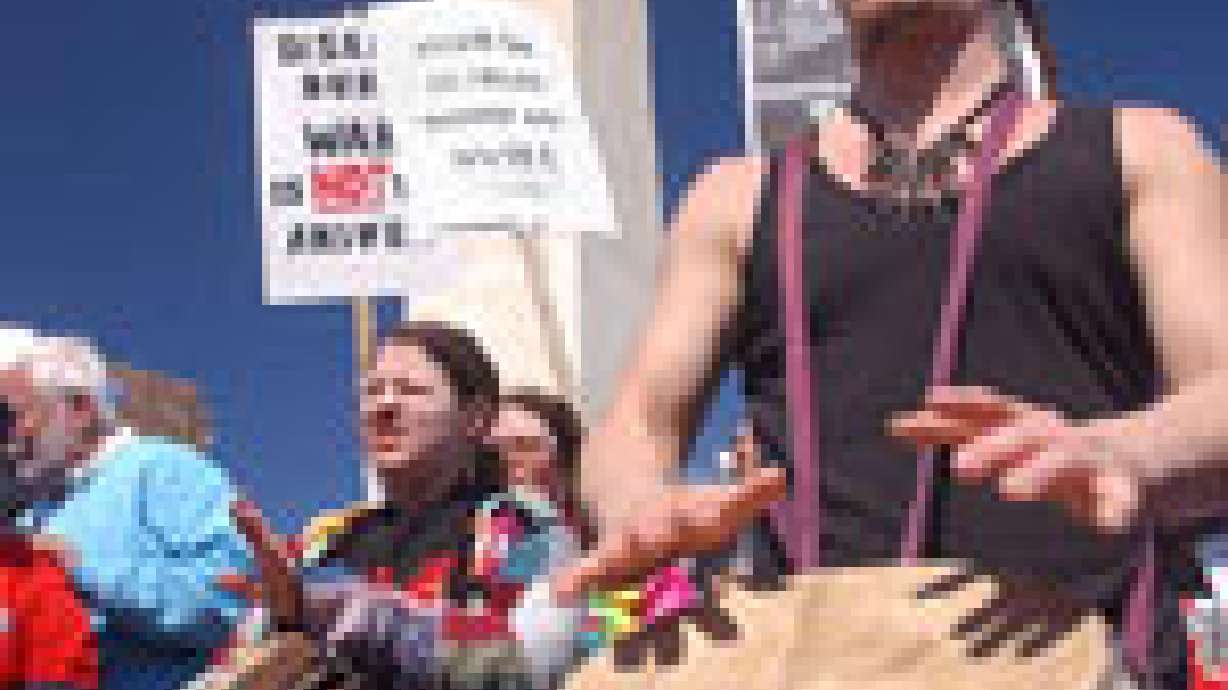Estimated read time: 5-6 minutes
This archived news story is available only for your personal, non-commercial use. Information in the story may be outdated or superseded by additional information. Reading or replaying the story in its archived form does not constitute a republication of the story.
WASHINGTON (AP) -- Some thought war is inevitable, others clung to hope they could slow or stop it. Either way, people in Washington and around the world joined Saturday in an outpouring of dissent no less persistent than the buildup of forces ready to strike Iraq.
The cries against war were summarized on the swarming grounds of the National Mall by Sally Baker, a teacher from Albany, N.Y. : "It's not right. It's not just. It's not going to make us any safer."
Tens of thousands rallied worldwide, in some cases pressing close to symbols of American power: the Washington Monument and the White House in Washington, the U.S. air base in Frankfurt, Germany, and U.S. embassies in Greece and Cyprus. They also took to the streets throughout Europe, Asia and the Middle East.
In Baghdad, where the reality of U.S. power could arrive any day, hundreds of thousands protested against the policies of the country poised to invade them.
Whether fatalistic or feeling they could still make a difference, Americans came from great distances to challenge the march toward war and President Bush's justifications for it. They said they were restless.
"The only thing I can do is get out in the street and say 'You're not doing this in my name,"' said Judy Ripley, 50, in Washington from Fort Myers, Fla.
Judy Robbins, 54, of Sedgwick, Maine, came on an 18-hour bus trip with her daughter Zoe, a nurse. "The alternative to being here," she said, "is just to stay home and give up."
Organizers of the Washington event -- a rally near the monument followed by a march around the White House and back -- asked people to leave their jobs, their homes or whatever they are doing on the day war starts, and walk outside.
Fifty yards from the Washington Monument, a display of poster-sized photographs showed Iraqi citizens going about their everyday activities. They were described as future war victims.
Iraqi civilians were on Heidi Johnson's mind at a rally drawing several hundred people in Concord, N.H. "It about brings me to tears, the thought that women and children are going to be killed in this war," said Johnson, 53.
In Washington, U.S. Park Police reinforced their ranks with officers from New York and San Francisco to help them handle the large crowds.
The force, which no longer estimates the size of rallies, said permits were issued for 20,000 to march but the gathering seemed much larger.
Sentiments were as varied as the locales, with many people saying Iraqi President Saddam Hussein is no threat to the United States; others insisted the dangers he poses can be dealt with through diplomacy and continuing U.N. weapons inspections.
Rep. John Conyers, D-Mich., told the Washington rally: "We need a regime change in the United States." But he added that Saddam should be tried for war crimes.
Lewis Wheeler, who came off of one of seven buses that drove to Washington from Boston, said Bush appears all too eager to unleash the troops.
"It seems like there is momentum building to use these soldiers," he said. "It's more glamorous to go to war than to hang in there with inspections for months and months and do the hard work."
Several dozen people stood on a Pennsylvania Avenue corner to challenge the antiwar activists. "We've got to take action," said Ainsley Hargus, 18, of Rockville, Md., a college freshman. "Sitting in a circle singing Kumbaya isn't going to change anything."
In Moundsville, W. Va., several hundred people marched in support of Bush and the more than 2,500 West Virginian National Guard and reserve members called to active duty.
Among them was Nancy Doty, who had three brothers in World War II and another brother killed in Korea. She brought her poodle, dressed in red, white and blue. "I'm here to support the fellas," she said. "I hate to see the boys go, but if they have to go, I'm for them."
In Jackson, Mich., where people rallied in a park, Jann Krupa, 54, dared hope the peace mobilization would make a difference. "I think it's pretty obvious that the president is going to do this," she said.
But each week brings more protesters out, she said. "There is still a shred of hope."
Bush spent Saturday at the Camp David, Md., presidential retreat before his trip Sunday to the Azores Island for a meeting with his supportive British and Spanish counterparts. With the diplomatic endgame under way, the leaders are trying one more time to win U.N. Security Council support for a war resolution.
Tony Murphy from International Answer, organizer of the protests, said the antiwar movement has encouraged leaders in other countries to resist Bush's attempt to win broad international sanction for a war.
"The Bush administration wanted to start this a while ago and we think the only reason they haven't is because of the millions of people that have been demonstrating," he said.
With some 250,000 soldiers, aviators and sailors deployed against Iraq, many at the Washington rally emphasized that they -- like those who support a war -- were thinking of the troops' well-being.
"We shouldn't send them over there unless we know it's the right thing to do," said Ferris Donoso of Rockport, Maine. "These are people with families they've left behind. I'm not going to ask them to fight this war."
She carried a sign reading, "Support Our Troops. Bring Them Home."
(Copyright 2003 by The Associated Press. All Rights Reserved.)









